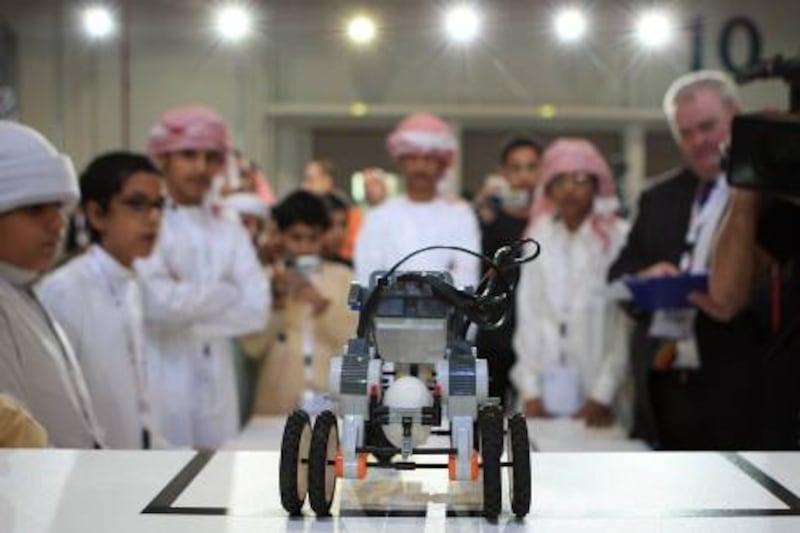ABU DHABI // Ascending five uneven steps with an egg balanced on its head, the robot had just two minutes to make its way back down without tripping.
It was designed and built by a team of Abu Dhabi schoolchildren as part of the World Robot Olympiad Arabia, the first regional edition of the global competition, which started yesterday. Just a few feet away, a group of Kuwaiti pupils assembled their own machines to sort and separate items by colour and size.
Teams from Qatar, Egypt, Bahrain and Oman were there, too, all hoping to win a place at the international finals, which will also be held in Abu Dhabi, in November.
The contest, held at the Abu Dhabi National Exhibition Centre, was organised by the Abu Dhabi Education Council (Adec). About 1,000 schoolchildren were given packages containing more than 600 Lego components, Mindstorms software and a tiny NXT computer "brick" to act as the robot's brain. They were then challenged to programme the robots to climb and race. In past events, the robots have been designed to play football using infrared transmitters and compass sensors.
As Hamad Ibrahim, 13, assembled his stair-climbing robot, the Al Suqoor Model School pupil kept one nervous eye on a team from another local school as the judges assessed their efforts.
"It is not that it is difficult, but you have to make a plan and think about every step," he said. "It is a little bit stressful, but I like making them, and doing things differently every time."
Feras al Obaidi, a pupil from AMA International School in Bahrain, said he had only been practising with the components for about a month but was quickly learning the computer programme so that he could teach his machine to judge the size and colour of objects and place them in the correct bin.
"It is all about the calculations," he said, adding that he expected to be back in Abu Dhabi for the finals in November.
The top eight performers in each category received medals and certificates and will go on to an elimination event in September ahead of the finals.
Officials said they were pleased to add a regional competition to the World Robot Olympiad calendar, noting that they had already received interest for next year's event from Algeria, Jordan and Saudi Arabia.
"Each country, as a result of this type of competition, realises the need for problem solving and team work, and we will see these types of events develop very quickly in the Middle East as they have in Asia," said Kerry Bailey, the curriculum consultant for Adec and one of the organisers of the event.
There is an increasing emphasis on local World Robot Olympiad events as they are seen as part of a broader move towards more interactive education, according to Dr Mugheer al Khaili, Adec's general director.
"We are trying to shift from the traditional way of education, which is memorising only, to the use of expression, scientific research to reach conclusions, creativity and invention," he said.
A dozen UAE teams were selected at last year's national competition to go to the world finals in the Philippines, where one local team received a prize for being the most creative.
The World Robot Olympiad was first held in 2004, and the UAE sent two teams to compete in 2008.
Ruaa Babiker, a Sudanese pupil at Qatr al Nada Secondary School in Abu Dhabi, was glad to have tasted international competition. "It is good practice, and a chance to see how others would react in these difficult situations," she said.






